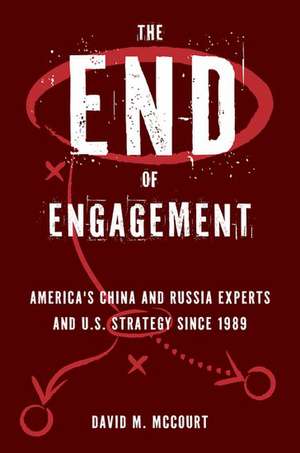The End of Engagement: America's China and Russia Experts and U.S. Strategy Since 1989
Autor David M. McCourten Limba Engleză Paperback – 20 dec 2024
| Toate formatele și edițiile | Preț | Express |
|---|---|---|
| Paperback (1) | 136.27 lei 10-16 zile | +36.64 lei 6-10 zile |
| Oxford University Press – 20 dec 2024 | 136.27 lei 10-16 zile | +36.64 lei 6-10 zile |
| Hardback (1) | 415.46 lei 10-16 zile | |
| Oxford University Press – 20 dec 2024 | 415.46 lei 10-16 zile |
Preț: 136.27 lei
Preț vechi: 155.46 lei
-12% Nou
Puncte Express: 204
Preț estimativ în valută:
26.08€ • 28.41$ • 21.97£
26.08€ • 28.41$ • 21.97£
Carte disponibilă
Livrare economică 22-28 martie
Livrare express 18-22 martie pentru 46.63 lei
Preluare comenzi: 021 569.72.76
Specificații
ISBN-13: 9780197765210
ISBN-10: 0197765211
Pagini: 320
Dimensiuni: 163 x 226 x 28 mm
Greutate: 0.46 kg
Editura: Oxford University Press
Colecția OUP USA
Locul publicării:New York, United States
ISBN-10: 0197765211
Pagini: 320
Dimensiuni: 163 x 226 x 28 mm
Greutate: 0.46 kg
Editura: Oxford University Press
Colecția OUP USA
Locul publicării:New York, United States
Recenzii
The End of Engagement is an astonishing and pathbreaking study. Sociologist David McCourt digs beneath the veneer of Sino-American and US-Russia relations to examine the twin communities of America's leading China and Russia specialists themselves. He astutely reveals how these experts have grappled with the repressive and revisionist turns of Xi Jinping and Vladimir Putin--but, more importantly, how the longstanding American policies of 'engagement' of each power have been shaken and forced to adapt to disturbing new realities. This is political sociology at its best, the comparative perspective is illuminating, and it should be carefully read inside and outside the Washington Beltway.
A phenomenal must-read. McCourt's book identifies and explains the essential process role played by foreign policy experts in generating the policy ideas for the executive and legislative branches to fight over and providing the people to implement (or challenge) those policies. By showing how real people, \ not the pejorative 'Blob,' struggle over bitter ideological, policy, and personal disagreements, McCourt unveils the fault lines of contemporary American \ foreign policy challenges: whether, in a post-unipolar world, the US should engage with Russia and China as they are or to try and contain those countries to reshape their policies? This dichotomy between engagement and containment is one of the best studies of interests versus values committed to paper in many years.
The End of Engagement stands as a landmark contribution to the study of U.S. foreign policy. Its sociological lens challenges established narratives, providing nuanced insights into the intersections of expertise, power, and international strategy. For scholars, policymakers, and readers seeking a deeper understanding of the mechanisms shaping policy decision-making, McCourt's work is both essential and thought-provoking, opening new avenues for exploring how epistemic communities influence the architecture of global relations.
A phenomenal must-read. McCourt's book identifies and explains the essential process role played by foreign policy experts in generating the policy ideas for the executive and legislative branches to fight over and providing the people to implement (or challenge) those policies. By showing how real people, \ not the pejorative 'Blob,' struggle over bitter ideological, policy, and personal disagreements, McCourt unveils the fault lines of contemporary American \ foreign policy challenges: whether, in a post-unipolar world, the US should engage with Russia and China as they are or to try and contain those countries to reshape their policies? This dichotomy between engagement and containment is one of the best studies of interests versus values committed to paper in many years.
The End of Engagement stands as a landmark contribution to the study of U.S. foreign policy. Its sociological lens challenges established narratives, providing nuanced insights into the intersections of expertise, power, and international strategy. For scholars, policymakers, and readers seeking a deeper understanding of the mechanisms shaping policy decision-making, McCourt's work is both essential and thought-provoking, opening new avenues for exploring how epistemic communities influence the architecture of global relations.
Notă biografică
David M. McCourt is an international political sociologist and Associate Professor of Sociology at the University of California, Davis. His primary research interests lie with the social sources of state action in international politics, with an empirical focus on the United Kingdom, the United States, and the European Union. He completed his graduate work at the European University Institute in Florence, Italy. Between 2012 and 2014, he was a Lecturer in International Politics at the University of Sheffield (UK). He is the author, among other works, of Britain and World Power Since 1945 (2014), American Power and International Theory at the Council on Foreign Relations, 1953-54 (2020), and The New Constructivism in International Relations Theory (2022).
